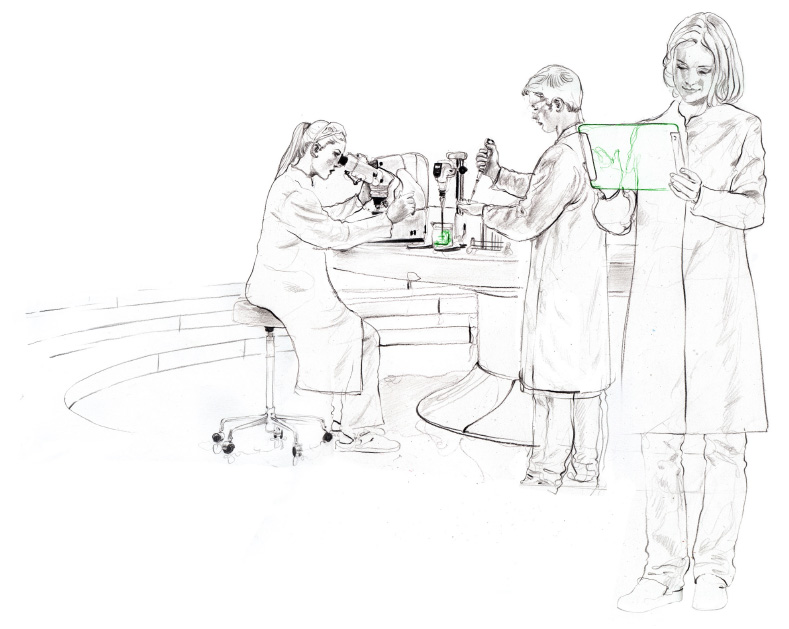An antibody sequencing service is an important resource for researchers and organizations that provides them with information on the sequence of amino acids in specific antibodies. Especially in the production of recombinant antibodies, sequencing is an important step to lead to a product with high specificity and low risk for cross-reactivity.
Antibody sequencing is a significant procedure for variable domains of the biochemical field. The expression describes the process of sequencing the genetic makeup of antibodies and determining the order of amino acids in an unidentified antibody. The sequence analysis delivers information on different types of immunoglobulin produced in B-cells like igg or igm.
There are different ways and methods to achieve this goal with the needed accuracy, which are all underlying constant optimization processes. As the immune system produces immunoglobulin by rearranging DNA segments during B-cell development, it is possible to mimic this process in the lab today. The DNA and RNA sequence information is especially important in the production of recombinant proteins.
In the development of biotherapeutics, antibody sequences are an important part for antibody engineering and protein characterization. The antibody protein sequence delivers important information on the characteristics of a specific antibody, its binding quality and cross-reactivity. If an antibody is not yet listed in one of the many online databases for antibody characterization, its sequence has to be determined.
Subscribe to our Newsletter
Get all the latest updates, and learn about our advancements in antibody production.
Subscribe now
Read more on antibody discovery
In order to clone and use antibodies in large-scale expression and the following purification process, antibody sequencing has to be completed first. The achieved sequencing data serves as a model for vector construction in recombinant antibody production.

In order to achieve antibody protein sequencing, different materials are needed. First, a sample of the antibody has to be provided and the enzymes have to be extracted by the help of a centrifuge. Furthermore, different reagents are needed to mark the isotype, or CDR (complementarity determining region). The samples are then run through a high mass accuracy instrument.
The consistency of monoclonal antibodies, or mabs, has proven to be very beneficial in diagnostic, research and the production of biotherapeutics. Monoclonal antibodies show a high specificity because they only bind to one epitope of a specific antigen. Compared to the less stable and consistent results achieved through polyclonal antibodies, which bind to different epitopes, cross-reactions are less likely. Therefore, the field of monoclonal antibody discovery through proteomics is high in demand and keeps on growing.1
There are several different sequencing technologies. While traditional small-scale Sanger sequencing marks the early beginnings of the determination of nucleic acids in antibodies, large-scale methods are the more modern option and therefore labeled as next generation sequencing or NGS. While the Sanger technique has provided numerous advancements and was utilized in the Human Genome Project, it is less accurate than modern, more effective strategies. Modern large-scale antibody sequencing methods include Hybrido sequencing, Edman sequencing and de novo antibody sequencing.
Hybrido Sequencing: Sequencing the cDNA for hybridoma cell’s variable light (VL) and variable heavy (VH) domains. The antibody sequences are obtained through cloning and sequencing of the coding mRNA of paired heavy chains and light chains through SCFV fragments.
Edman Sequencing: A sequencing method relying on the gradual removal and following identification of one amino acid after another. This process is often criticized because it is more prone to errors and time intensive
De novo peptide sequencing: Liquid chromatography-tandem mass spectrometry (LC-MS) is used to determine the mass-to-charge ratio of different pieces of an antibody sequence. With the help of bioinformatic software overlapping sequences, the fragments can be recognized, labeled and rebuilt into a single complete sequence.
There are a number of different formats that can be used for antibody sequencing. The diversity of antibody variable regions is a challenge to cDNA (DNA synthesized through RNA and an RT enzyme) sequencing and requires the use of degenerate primers for cDNA amplification.
The field of antibody sequencing underlies constant optimization, to minimize cost and time necessary to achieve precise results.
In order to optimize the workflow in recombinant antibody production, high-quality hybridoma sequencing data is needed to achieve the needed specificity of the desired antibody and avoid contamination and undesired mutations in the process.
evitria’s main focus is on the recombinant antibody production service. As the field of DNA sequencing requires its very own medical equipment and repertoires of data templates, we are proud to have found powerful partnerships that enable us to provide the full-length process of antibody sequencing to the final product.